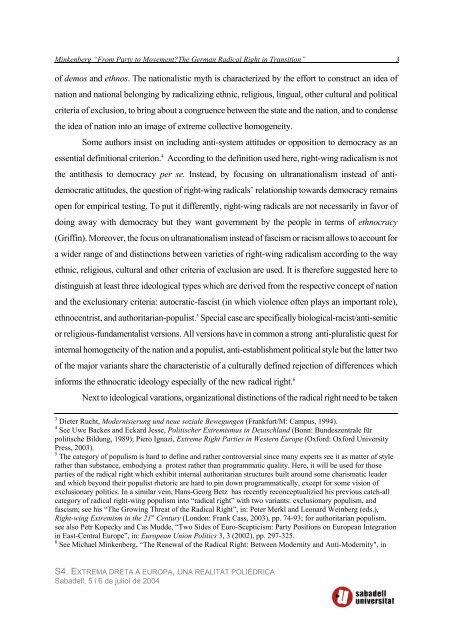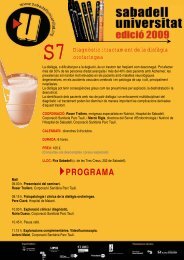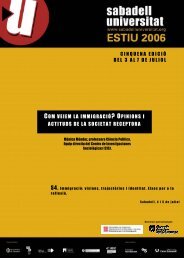From Party to Movement? The German Radical Right
From Party to Movement? The German Radical Right
From Party to Movement? The German Radical Right
Create successful ePaper yourself
Turn your PDF publications into a flip-book with our unique Google optimized e-Paper software.
Minkenberg “<strong>From</strong> <strong>Party</strong> <strong>to</strong> <strong>Movement</strong>?<strong>The</strong> <strong>German</strong> <strong>Radical</strong> <strong>Right</strong> in Transition” 3<br />
of demos and ethnos. <strong>The</strong> nationalistic myth is characterized by the effort <strong>to</strong> construct an idea of<br />
nation and national belonging by radicalizing ethnic, religious, lingual, other cultural and political<br />
criteria of exclusion, <strong>to</strong> bring about a congruence between the state and the nation, and <strong>to</strong> condense<br />
the idea of nation in<strong>to</strong> an image of extreme collective homogeneity.<br />
Some authors insist on including anti-system attitudes or opposition <strong>to</strong> democracy as an<br />
essential definitional criterion. 4 According <strong>to</strong> the definition used here, right-wing radicalism is not<br />
the antithesis <strong>to</strong> democracy per se. Instead, by focusing on ultranationalism instead of anti-<br />
democratic attitudes, the question of right-wing radicals’ relationship <strong>to</strong>wards democracy remains<br />
open for empirical testing. To put it differently, right-wing radicals are not necessarily in favor of<br />
doing away with democracy but they want government by the people in terms of ethnocracy<br />
(Griffin). Moreover, the focus on ultranationalism instead of fascism or racism allows <strong>to</strong> account for<br />
a wider range of and distinctions between varieties of right-wing radicalism according <strong>to</strong> the way<br />
ethnic, religious, cultural and other criteria of exclusion are used. It is therefore suggested here <strong>to</strong><br />
distinguish at least three ideological types which are derived from the respective concept of nation<br />
and the exclusionary criteria: au<strong>to</strong>cratic-fascist (in which violence often plays an important role),<br />
ethnocentrist, and authoritarian-populist. 5 Special case are specifically biological-racist/anti-semitic<br />
or religious-fundamentalist versions. All versions have in common a strong anti-pluralistic quest for<br />
internal homogeneity of the nation and a populist, anti-establishment political style but the latter two<br />
of the major variants share the characteristic of a culturally defined rejection of differences which<br />
informs the ethnocratic ideology especially of the new radical right. 6<br />
Next <strong>to</strong> ideological varations, organizational distinctions of the radical right need <strong>to</strong> be taken<br />
3 Dieter Rucht, Modernisierung und neue soziale Bewegungen (Frankfurt/M: Campus, 1994).<br />
4 See Uwe Backes and Eckard Jesse, Politischer Extremismus in Deutschland (Bonn: Bundeszentrale für<br />
politische Bildung, 1989); Piero Ignazi, Extreme <strong>Right</strong> Parties in Western Europe (Oxford: Oxford University<br />
Press, 2003).<br />
5 <strong>The</strong> category of populism is hard <strong>to</strong> define and rather controversial since many experts see it as matter of style<br />
rather than substance, embodying a protest rather than programmatic quality. Here, it will be used for those<br />
parties of the radical right which exhibit internal authoritarian structures built around some charismatic leader<br />
and which beyond their populist rhe<strong>to</strong>ric are hard <strong>to</strong> pin down programmatically, except for some vision of<br />
exclusionary politics. In a similar vein, Hans-Georg Betz has recently reconceptualizied his previous catch-all<br />
category of radical right-wing populism in<strong>to</strong> “radical right” with two variants: exclusionary populism, and<br />
fascism; see his “<strong>The</strong> Growing Threat of the <strong>Radical</strong> <strong>Right</strong>”, in: Peter Merkl and Leonard Weinberg (eds.),<br />
<strong>Right</strong>-wing Extremism in the 21 st Century (London: Frank Cass, 2003), pp. 74-93; for authoritarian populism,<br />
see also Petr Kopecky and Cas Mudde, “Two Sides of Euro-Scepticism: <strong>Party</strong> Positions on European Integration<br />
in East-Central Europe”, in: European Union Politics 3, 3 (2002), pp. 297-325.<br />
6 See Michael Minkenberg, “<strong>The</strong> Renewal of the <strong>Radical</strong> <strong>Right</strong>: Between Modernity and Anti-Modernity", in<br />
S4. EXTREMA DRETA A EUROPA, UNA REALITAT POLIÈDRICA<br />
Sabadell, 5 i 6 de juliol de 2004













